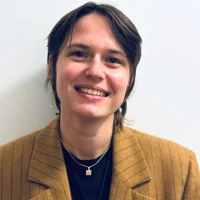Julia West

Alumni in Focus

Julia West
Class of 2019, MSc Culture and Conflict
Policy Officer in the Austrian Federal Ministry of the Interior
I work in the complex field that is migration. My master’s at LSE centred around culture and conflict – two concepts inseparably tied to this ever-changing, election-deciding field. This degree offered me a framework through which European migration politics can be not only analysed but also narrated and therefore shaped. Especially this comprehension of culturally coined narration and the skill to apply it is key in my daily work, for example when writing speaking notes.
Rerum cognoscere causas// To know the causes of things – LSE’s motto has been a driving force in both my studies and professional career.
I chose to pursue social sciences to gain a better understanding of the way in which we as individuals - we as people - relate to each other and the world around us. Studying Social and Cultural Anthropology as well as Transcultural Communication and Languages in my undergraduate were a first step on this journey.
My time at LSE was, perhaps above all, filled with great conversations inside and outside the classroom. Because what is the LSE, if not the people that shape it? Its students, professors, and staff? Studying at LSE, for me, was coined by a dedicated and motivated co-hort. It was enriched by learning from and conversing with leading academics, and it was made possible by the staff fostering an environment of exchange.
Leaving LSE with a degree and starting a career during the onset of a global pandemic was challenging. What is more, I had no definitive career planned out. I found, however, that giving myself time to explore and gain better insights into different institutions helped me in the long run. So, I interned at the United Nations Office on Drugs and Crime, did a traineeship in the Austrian Development Agency, and a graduate internship at the Austrian Federal Ministry of Foreign Affairs. All of these stops ultimately shaped the vision I formed for my future.
Currently, I work in the complex field that is migration. My master’s at LSE centred around culture and conflict – two concepts inseparably tied to this everchanging, election deciding field. Two core classes of the degree, The Culture of European Politicsand Culture and Security in Global Politics, offered me a framework through which European migration politics can be not only analysed but also narrated and therefore shaped. Especially this comprehension of culturally coined narration and the skill to apply it is key in my daily work, for example when writing speaking notes.
The sort of critical thinking encouraged by LSE – to look at the causes of things – still greatly impacts my work. Because a better understanding of driving forces and the impact of policies on a myriad of levels is key to navigating the migration landscape.